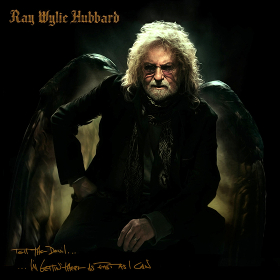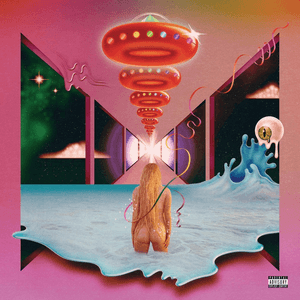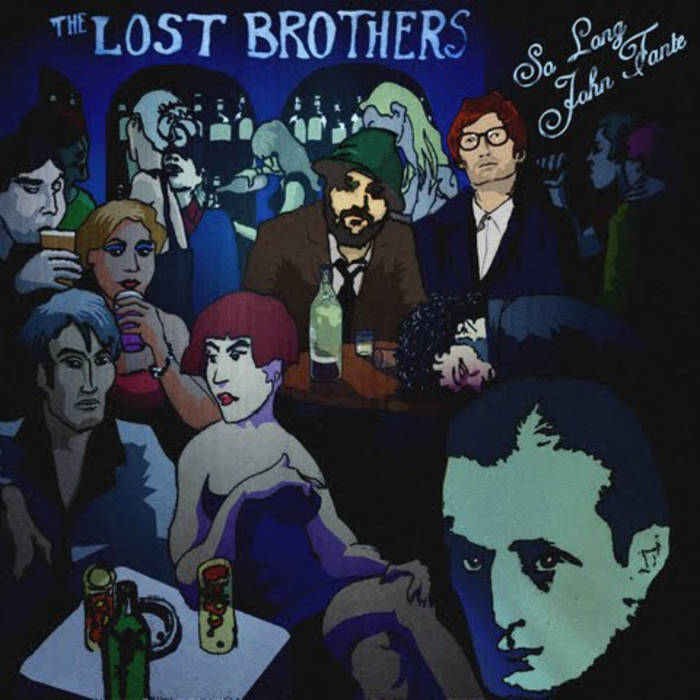Rating: 5/10
I’ve given this album a ton of listens, and truth be told, it gets worse almost each time. It’s a difficult rating to assign because I think there are some truly excellent songs here; the problem is that they’re mixed in with some incredibly boring material that balances out the record to just be really average. It’s not necessarily a fault of the writing or of the instrumentation, it’s the sameness permeating this album that ultimately brings it down after further listens.
But let’s talk about the killer songs first because they’re sprinkled in here, reminding us what a songwriting genius Ray Wylie Hubbard really is. This album deals a lot, as its title would suggest, with God and the devil and matters of repentance and redemption. We get a truly epic tale in “Lucifer and the Fallen Angels,” as they hitchhike with Ray Wylie to Mobile, Alabama, and Lucifer recounts the story of getting banished from heaven and continuously advises Hubbard to abandon his plan of going to Nashville, saying, “it’s better to reign in hell than serve in heaven.” He suggests that Ray Wylie go “someplace like Texas,” where they still appreciate good music. On the other side of the spectrum, Hubbard details the story of the creation and the fall in Genesis in what can only be described as a redneck retelling in the opener, “God Looked Around.” His storytelling skills are also on fine display in “House of the White Rose Bouquet,” a haunting tale about a “woman of desire” named Olivia whom the narrator once loved. She now haunts the brothel where they worked, but it’s now been turned into a theater, or as Ray Wylie calls it, “a beacon of decency.”
We have two collaborations featured on this record, and the title track is definitely going to be the one getting more attention because it features Lucinda Williams and Eric Church, but it’s the Patty Griffin harmonies on the closer, “IN Times of Cold,” that make this song the better collaboration by far. This song ends the album appropriately, reflecting on heaven but asserting that “I’ll likely take my place in hell.”
As for the title track, it’s a good narrative, and the details and melodic touches here are nice, especially considering the overwhelming sameness in much of the album which I am about to address, but Lucinda Williams’ part here just ruins this. The only word I can think to properly describe her contribution is careless; she doesn’t sing in time with Ray and Eric Church, her voice sticks out like a sore thumb, and she doesn’t sound at all engaged with the lyrics of the song. Eric Church is much more respectful of the song and the words, but it’s like Lucinda just wanted to be heard.
Why am I spending so much time harping on this particular song? Because it should have been one of the standouts. This album is filled with songs having very little instrumentation and almost no choruses. The only songs where we are not hit with the same repeated verse, over and over, until we’re virtually hypnotized by this repetition of rhythm and lack of interesting melody, are the collaborations. It’s like a breath of fresh air to hear the title track come on and get a little more variety, and then Lucinda Williams just comes along and ruins the whole thing for me.
And songwriters, what is this tendency to forsake your melodies? It doesn’t matter that the lyrics are brilliant if they’re translated into a boring, lifeless piece of music. This is what ultimately takes this album from a 7.5 straight down to a 5. The three songs I mentioned above? Yes, they’re all killer lyrically, and I stand by that, but all of them are incredibly repetitive. The lyrics hold up well enough on these songs that it doesn’t matter, but almost the whole rest of the record is so plain and forgettable that even these songs are tarnished in context. On some of the other tracks, it’s not as if the lyrics are bad. It’s just that a song is more than lyrics, and we rely on melodies to make these words come alive. Much of it just sounds so unfinished, like we’re listening to the first drafts of these songs before they were given a proper chance to find the right instrumentation and production and truly come to life. I especially get that impression listening to “Open G,” like Ray Wylie Hubbard was just messing around with his guitar and never actually intended that song to be on the final version of the record. It’s a completely pointless track, so that at least would be a legitimate explanation for its existence here.
Overall, I don’t hate this record. In fact, I think there are some truly brilliant moments here, particularly in “Lucifer and the Fallen Angels” and “House of the White Rose Bouquet.” But it’s an album whose problems emerge over time, and there’s not much longevity at all. At first, you hear some killer tracks, some decent ones, and yeah, maybe a couple boring ones to round it out. Not a perfect album, but a decent one. And then, through repeated listens, the overwhelming sameness in this record starts to wear it down. It’s a lack of care for the instrumentation and especially for the melody that if given more attention could have really changed this whole album. All in all, it just seems really uninspired, and Ray Wylie Hubbard is certainly capable of much better.



